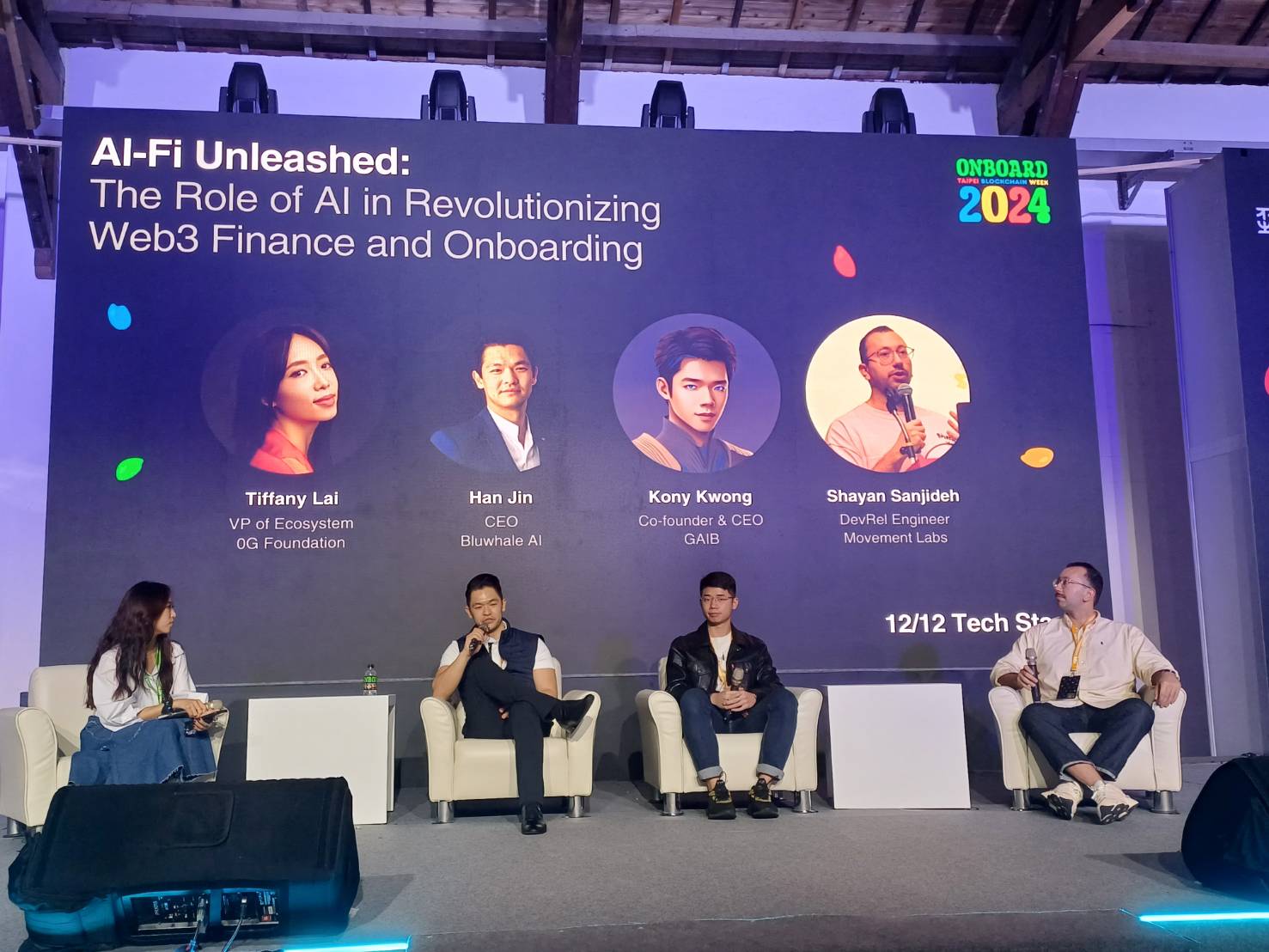The Taipei Blockchain Week (TBW) was grandly launched on the 12th, with the keynote speech "AI-Fi Unleashed: The Role of AI in Revolutionizing Web3 Finance and Onboarding" inviting Tiffany Lai, Deputy Executive Director of the 0G Labs ecosystem, Han Jin, CEO of Bluwhale AI, Kony Kwong, Founder and CEO of GAIB, and Shayan Sanjideh, Developer Ecosystem Engineer of Movement Labs.
First, host Tiffany Lai mentioned that AI and blockchain are the two most transformative and disruptive technologies today. When these two are combined, they will unleash limitless possibilities. This speech will focus on how AI can revolutionize the financial system, improve user convenience, and empower individuals globally.

DeFi and AI Integration
In the Q&A session, Tiffany Lai asked Han Jin about how BluWhale AI helps individuals turn data into assets, and how he views the integration of DeFi and finance?
Han Jin said that BluWhale AI aggregates multi-chain information through AI and distributes suitable information (such as smart wallets, Non-Fungible Tokens, etc.) to users. BluWhale positions itself as a Layer3 aggregator, as this layer belongs to the "consumer layer" from the L3 perspective, including consumers' Dapps, DeFi platforms, Web3 games, and so on.
Regarding the integration of DeFi and AI, Han Jin said that BluWhale AI supports mobile node operation to achieve decentralization of the network. He also pointed out that the current state of Web3 + AI is still in a very early stage.
Movement's Perspective on On-Chain AI Development
Tiffany Lai then asked Shayan Sanjideh, how the Ethereum Layer2 protocol Movement views the development of on-chain AI?
Shayan Sanjideh first joked that he should be the least interested in AI among the speakers present, then he stated that the main reason for Movement's existence is to bring "performance" and "security" to Ethereum:
- For performance, Move uses parallel virtual machines, so depending on the type of transaction you want to submit to the blockchain, due to the static typing nature of the Move language, it can execute two transactions in parallel. This is in stark contrast to Ethereum, where all transactions, regardless of content, must queue and wait to be executed.
- As for security, since Move is a statically typed language, it can capture many vulnerabilities, common failures, and hacker attacks before they occur. To date, Sanjideh believes that about $7 billion in funds have been lost due to hacker attacks on Ethereum smart contracts.
Additionally, Sanjideh mentioned that Layer3 is often criticized in the community as "now we have L3, will there be L4, L5 next?", but he hopes users can carefully consider the original intention of Layer3.
GAIB's AI Investment Strategy
Similarly, Tiffany Lai also asked Kony Kwong how he views the construction of AI infrastructure in the entire crypto industry, and what is GAIB's blueprint and progress in AI?
Kony Kwong said that blockchain not only brings decentralization, trustlessness, and transparency, but also brings business models and tokenization, providing economic incentives for the entire project.
Kwong also mentioned that Web1 and Web3 are both open-source and pursue decentralization, but the difference is that Web1 did not have a real business model. Now, we can realize a long-term and sustainable business model through tokenization, and this is not limited to the "cryptocurrency blockchain" field, but various fields (AI, real estate, finance, etc.), and there are currently many developers dedicated to building AI infrastructure and applications on the blockchain and tokenizing them for user investment.
Kwong then stated that the future will see an explosive growth of AI in applications and infrastructure, and GAIB will focus on three aspects: "AI, GPU, and Financialization", and apply them at the infrastructure level:
That's why we're so focused on infrastructure, because we have the relevant capabilities and unique accessibility. For us, we're going to financialize the GPU through these two different assets, turn it into an investable instrument, and then build all the DeFi modules on top of it, including GPU-backed stablecoins, lending, options, and futures.
How AI Can Enhance User/Developer Experience
Next, Tiffany Lai asked, how can AI improve the user experience and usability to attract new users to truly enter Web3?
Han Jin first replied that some people may enter the blockchain just to make money and then leave, but in his view, blockchain is a long-term technology that will be adopted globally, and may even replace Web2.
To achieve this, the blockchain field needs "Mass adoption", and the target users are ordinary consumers, but this group of consumers has already become accustomed to personalized experiences in their daily lives, which is currently lacking in Web3. However, Han Jin believes that AI can enhance the personalized experience of consumers in Web3, making them true Web3 users.
Tiffany Lai then asked Shayan Sanjideh, has Movement considered using AI to further simplify the user onboarding and adoption process?
Shayan Sanjideh then observed from the perspective of user experience, from the past horse-drawn carriages to automobiles, technology and experience are continuously being updated. Sanjideh believes that AI will become one of the major technologies that can make human life better. As AI is gradually integrated into society and work, Movement also plans to use AI to make developers' work easier and simpler.
Taiwan may become the center of the AI revolution
Tiffany Lai then asked the speaker, after Trump's victory, he has repeatedly hinted that he will actively promote AI, and what impact will this have on the global pattern? And should Taiwan also adopt a similar strategy?
Han Jin first stated that he believes regulating the development of AI is crucial, especially in terms of its speed and direction. He pointed out that allowing the large Web2 AI companies to dominate the development of AI is a potential risk. In this regard, he believes that the decentralized nature of BlockTempo may play a key role in regulating AI.
Kony Kwong also stated that Trump's inauguration is absolutely good news for the AI field, and Taiwan may become the center of the AI revolution in the future.







